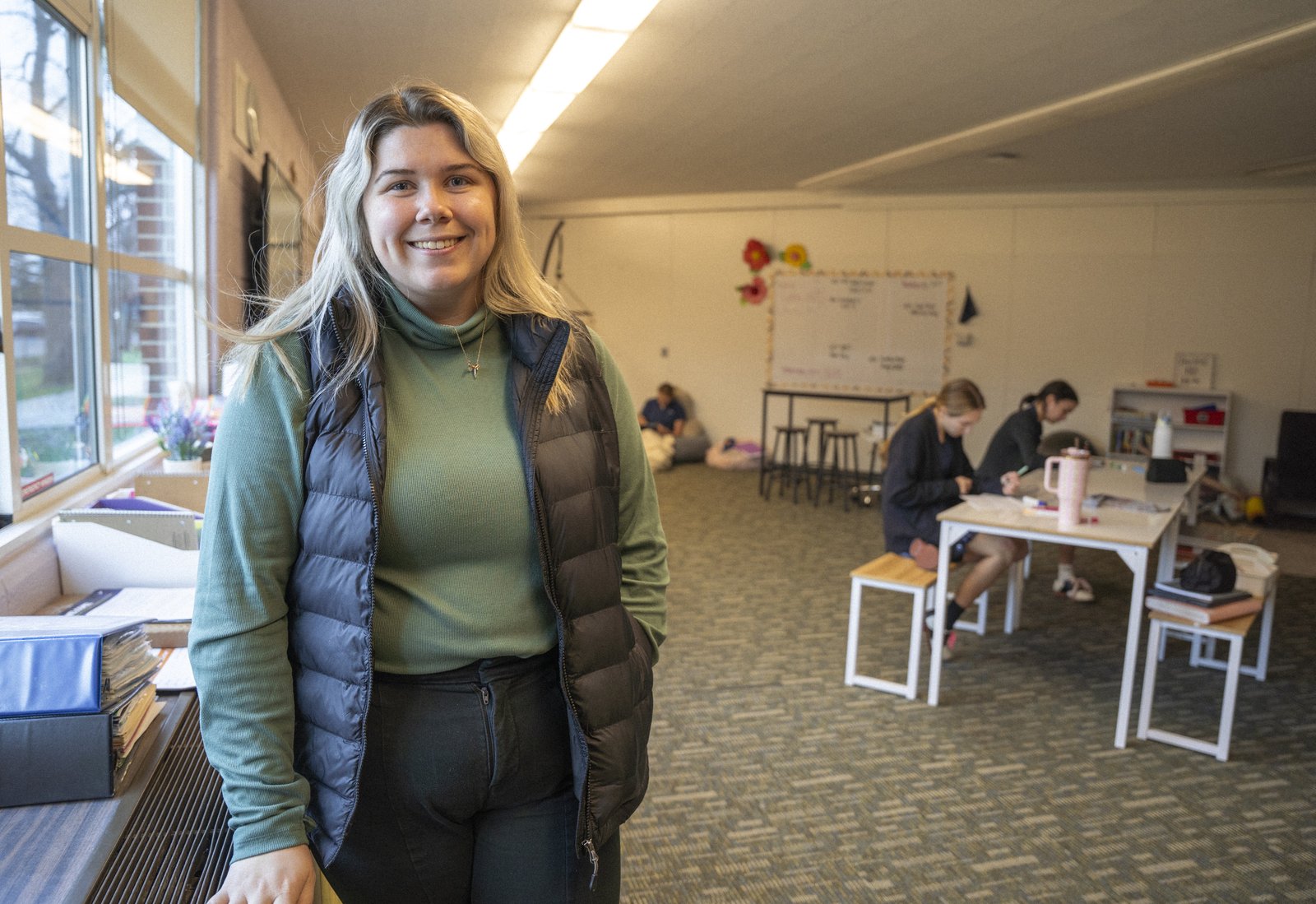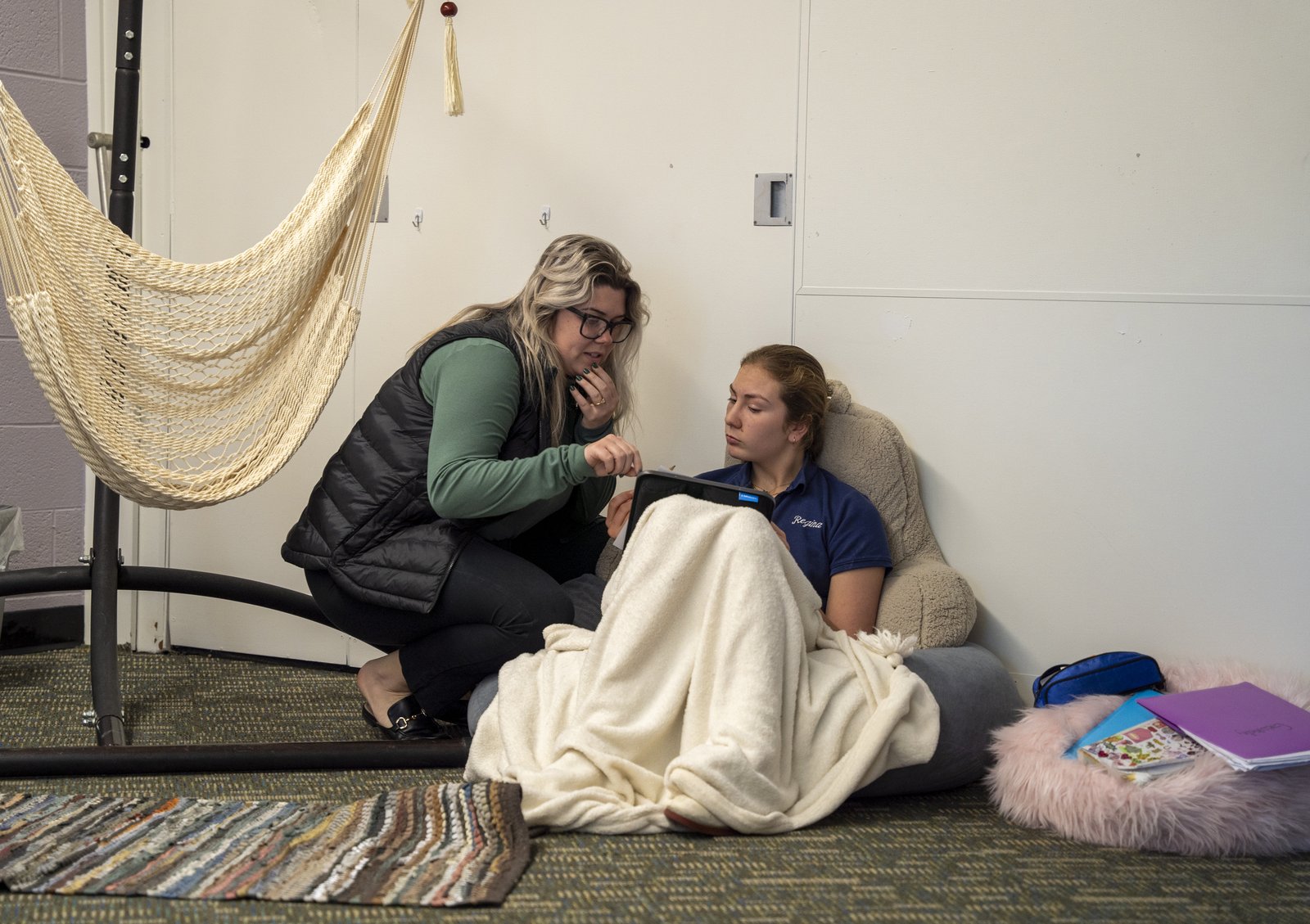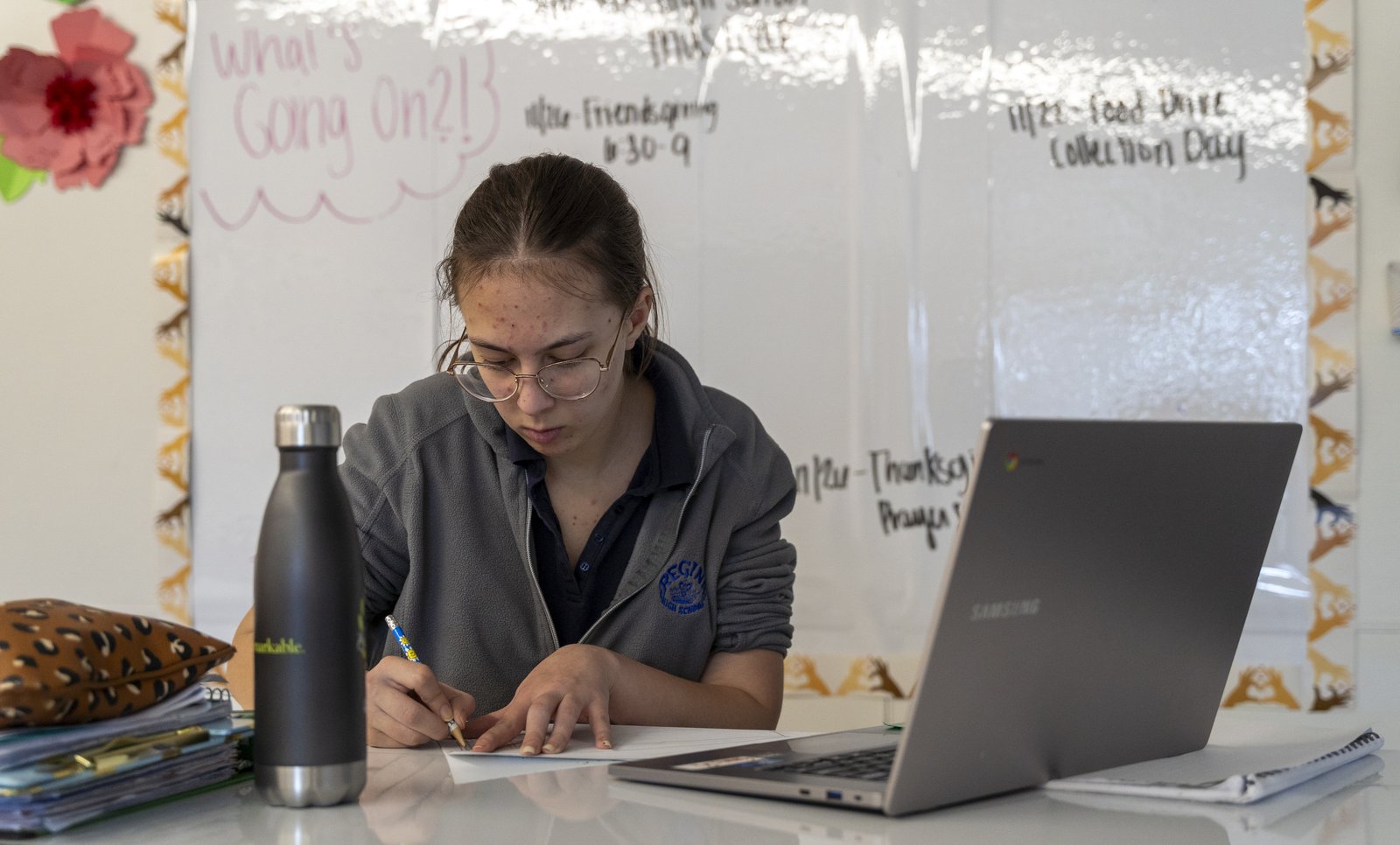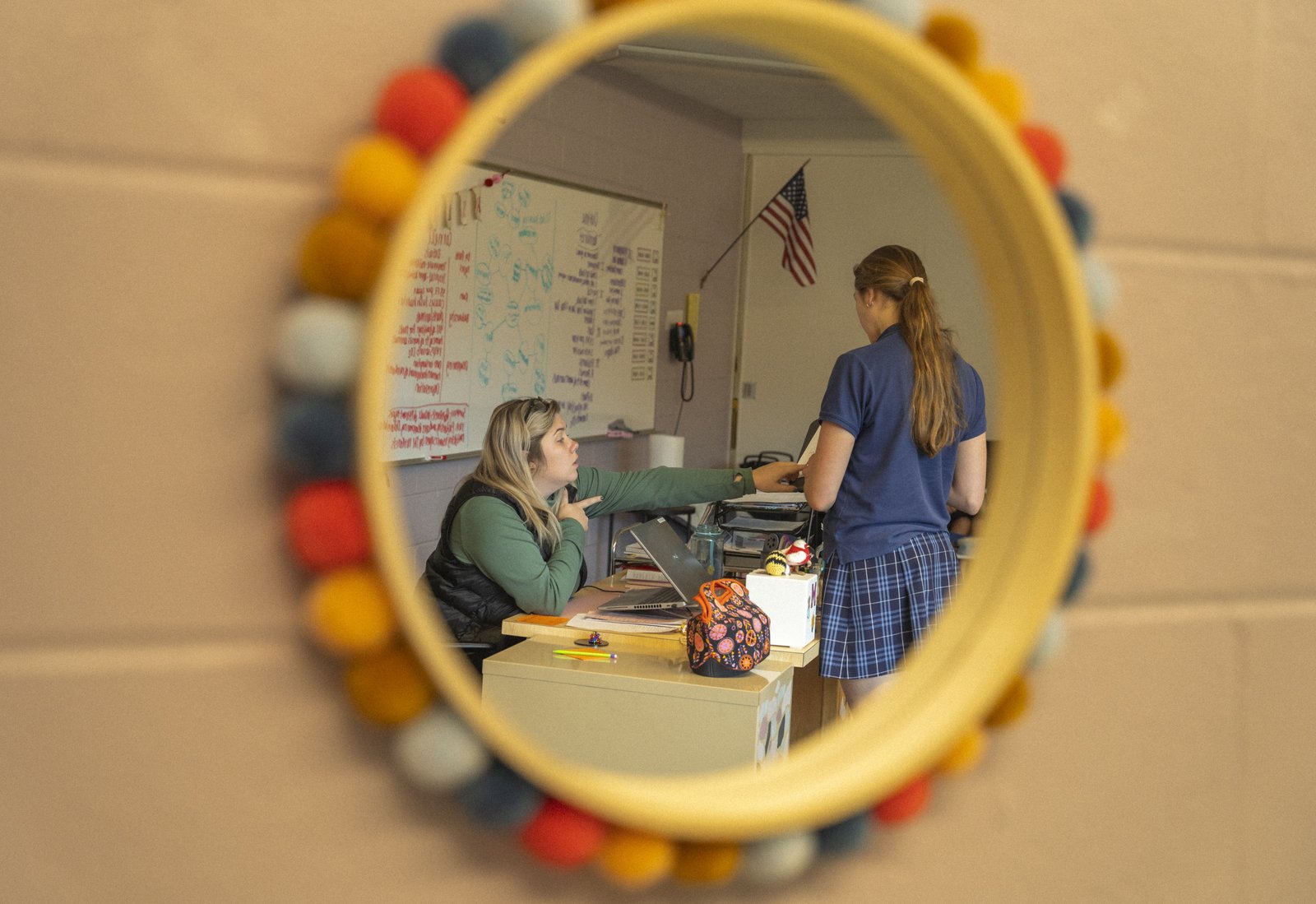Building on its current accommodation, school's new Mundi Inclusion Program supports students with learning challenges
WARREN — In order to help more students achieve their potential and access a high-quality Catholic education, Regina High School in Warren is launching a new inclusion program to accommodate students with significant special needs and learning disabilities.
The Mundi Inclusion Program, which will launch during in the 2025-26 school year, will build on the school's current student assistant program, which began in 2020, to more intimately address the needs of students who require specific accommodations. The program, named for the school’s patroness and namesake, Regina Mundi — Mary, Queen of the Universe — is the passion project of special education teacher Michelle DeGrez and principal Ann Diamond, a Regina alum.
“We saw that there are students who just need a little bit of a nudge in order to be successful, and it is important that we are able to service all students, regardless of their varying disabilities,” Diamond explained to Detroit Catholic. “We felt it was important that we start to open the doors and really help these students be successful, not just let them sit in a classroom.”
Students who need special accommodations currently have access to a learning resource center — a comfortable, quiet space where students can come to decompress or a quiet environment to complete assignments or take tests.
“Students with special accommodations can come down if they are looking for one-on-one instruction, or if they have specific questions or whatever it may be … we have an open door policy (where students can) come down and look for me or our other instructor, which is a pretty unique thing,” DeGrez said.
DeGrez, along with another instructional specialist, Laura MeLampy, occasionally lends support to other teachers at the all-girls school, stopping by classrooms to work with students and to be an extra set of hands. They also work with teachers to modify assignments and create learning plans, which may give a student permission for extra time on assignments or tests or let them do work in a separate environment. They work one-on-one with students to make a plan that works for them.

DeGrez and MeLampy split the caseload of 40 students with special needs — approximately 10 percent of the student population. DeGrez says the number of students in the program has grown.
“Students with learning challenges or more significant disabilities have (often not) been able to have a faith-based education, and it’s important if a family wants to have a faith-based, Catholic education, then they should be able to have it,” Diamond said. “That is really one of the reasons we wanted to give it a go. The Catholic Church says all are welcome, so we have to really work on that so we can we open the doors for any young woman who wants a Catholic education, regardless of the challenges that they face.”
The current student inclusion program is one of the main reasons Emily Rosenzweig chose Regina for her daughter Emma, now a sophomore.
“(Emma) is what is called ‘twice exceptional,’ so in her early schooling, the issue we had with public schools is that she is gifted, so she needs to be challenged more than what teachers are prepared to do,” Rosenzweig said.
As Emma got older, her needs changed and grew.
“At first, my struggle was getting the schools to accept the diagnoses, then once the diagnosis was accepted, there was just all of the red tape at public schools for getting a change to the accommodation plan,” Rosenzweig explained. “By the time you got through the red tape, her needs had changed, and then I was doing it all over again.”
All of this changed with Regina, where Rosenzweig said accommodations and changes are made as needs arise and the instructors anticipate her needs.
"The fact they can anticipate what she needs means she is getting what she needs when she needs it and is not missing out," Rosenzweig said.
“I have access to things now that I didn’t have in middle school,” Emma, 15, told Detroit Catholic. "In middle school, I got the minimum amount of accommodations needed to survive, but here, it's the maximum. If anything comes up that is a problem, it gets solved, and it is really helpful. I focus more on my academics instead of just trying to understand what is going on.”
Emma works with DeGrez, who, along with MeLampy, works with Regina students with a wide range of disabilities: specific learning disabilities, genetic disorders, cognitive impairments, medical diagnoses, birth defects and different developmental needs.
With the program's expansion, they will be able to accommodate approximately seven students with more severe needs, DeGrez explained, such as Down syndrome, significant brain injuries or more significant cognitive impairments.


DeGrez and Diamond agree they “want to help as many students as possible.”
“We don’t want to put a cap on it because if a student wants to come to Regina and wants a Catholic education, we’re going to give that to them,” DeGrez said. “We are going to do whatever we need to do in order to make it work.”
The Mundi Inclusion Program will expand on the resources already in place and add new resources as well, DeGrez explained. This includes implementing a new special education curriculum, which will mirror the general education curriculum but include visual aids and hands-on resources.
“It's going to be the same concept (as the general curriculum), but it is going to be different assignments, different tests,” DeGrez said. “If a Mundi Inclusion student is in Algebra I, they won't be getting the same assignments as the general education students in Algebra I — but they will still be in class for notes and lessons and things like that; their homework assignments will just be a bit different.”
DeGrez explained they will work individually with each student to accommodate their needs. If the special education curriculum isn’t enough, they will further tailor their lesson plans and resources to meet those needs.
Regina is also launching a peer-to-peer mentor program that will pair a general education student with an inclusion student in the general education classrooms.
“The peer mentor is really going to act as a guide for the Mundi student and a model for them, to help them along the way in their classes,” DeGrez said. “If they struggle taking notes or communicating with their parents, or even just staying on a topic, that peer mentor is going to help redirect them, make sure they are taking notes, make sure they are prepared for tests, make sure they are prepared for the next classes and things like that.”
The goal is to integrate the Mundi Inclusion students with their peers and in the classroom as much as possible, DeGrez said.
Diamond added the school wants every student to feel like they are a part of the Regina community.
“We want them to be part of the extra-curriculars and be part of the sports programs, if possible — everything that we offer to any student,” Diamond said. “When we say they are welcome at Regina, we mean that they are welcome in every aspect. Michelle, Laura and I really believe that the more they feel included, the more they will be a part of our community, and our regular education students will be more empathetic. The term Michelle always uses is 'a more compassionate community' because the world is not perfect for people walking down the street; the world is made up of all kinds of different people.”

Rosenzweig believes the Mundi Inclusion Program is a great example of the values Regina instills in its students.
“It really seems to be innate to who they are — they just do it so well. Having different abilities is an asset to any organization, but also just for Emma to be able to see that there are people like her and for her to be friends with them,” Rosenzweig said. “The more people that are in the program, the more likely she is to find somebody who thinks like her, learns like her, and would help. She has a great social life there, she has plenty of friends, but it would be nice for her to be able to have someone that she has some similarities with in that regard.”
Rosenzweig hopes more schools begin to offer extensive accommodations like the Mundi program. She is currently trying to find a high school for her son, who has a different diagnosis than Emma and needs accommodations.
In August 2024, the Catholic Foundation of Michigan launched the St. Margaret of Castello Granting Fund to assist schools looking to acquire the resources and know-how to incorporate students with special needs into the general school environment.
DeGrez and Diamond added that many local Catholic schools are already serving students with special needs, and that as Regina's program grows, the school plans to add resources.
“I really think it is all about courage and being brave and making that decision that you are going to open your doors,” Diamond said. “Quite frankly, every student comes with something. No one is perfect, so this is just another level, and we will just need to have the courage to open the doors and make it work.”
Copy Permalink
Catholic schools












